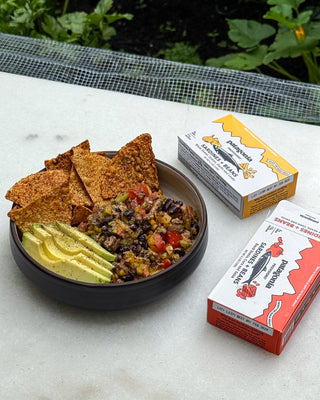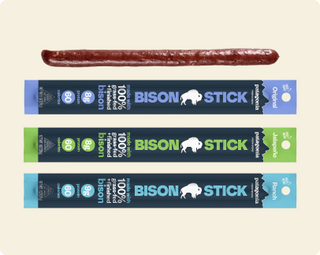
Mussels
Cultivated off the coasts of Chile, Portugal and Spain, our mussels naturally improve the quality of the water around them as they grow, providing a model of restorative ocean aquaculture. These plump, briny-sweet morsels make fine eating—and they’re rich in protein, too.*
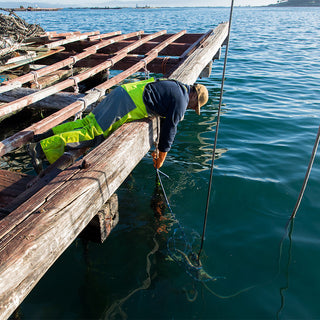
NUTRITION: SMALL BUT MIGHTY
MUSSELS PACK AS MANY NUTRIENTS AS LARGE FISH, WITH THE ADDED ENVIRONMENTAL BENEFITS OF BEING LOWER ON THE FOOD CHAIN
A complete protein, mussels contain all the essential amino acids needed to support functions like building muscles and skin. They’re a good source of iron, which carries oxygen to the blood to help maintain your energy, and their levels of vitamin B-12, which keeps red blood cells healthy, are well off the chart.* A serving of our mussels contains as much as 1000% of the daily value of this vitamin.
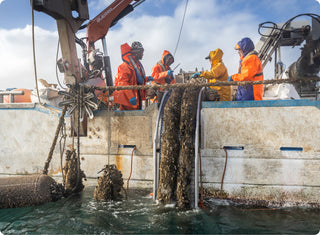
SOURCING: A COASTAL HARVEST
OUR MUSSELS ARE CULTIVATED OFF THE COASTS OF CHILE, SOUTHERN PORTUGAL AND NORTHERN SPAIN . THESE LOCATIONS PRODUCE EXCELLENT MUSSELS WITH A SIMILAR RICH, SAVORY FLAVOR.
Mussels are native to these regions and naturally thrive there, thanks to upwelling of deep ocean water that brings in nutrients and phytoplankton, a natural food source. Off the coasts of Sagres, Portugal and Chiloe, Chile we work with ASC certified farms. The mussels we source from Galicia come from certified EU Organic farms in the Galician bay of Ría de Arousa.
In spring, mussel seeds (spat) are introduced to long line of rope which are suspended in the water column. Once the mussels reach maturity after about a year, local farmers haul them up to harvest. Conservas Antonio Pérez Lafuente, a regional cannery in business for well over a century, steams the mussels, causing them to shed excess liquid that would dilute the seasonings in the can. Typically this broth would be discarded, but Pérez Lafuente adds some to each can, along with Mediterranean seasonings and extra-virgin olive oil. The result is less waste and a broth so delicious you can drink it straight from the can.
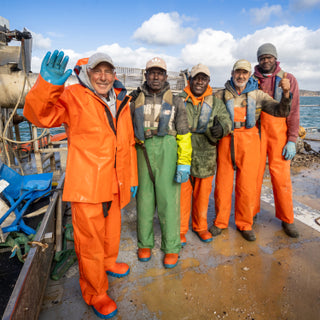
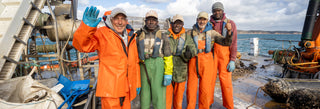
Shop Mussels
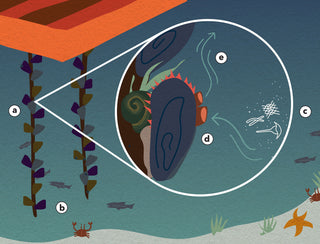
ENVIRO: TINY ECO WARRIORS
Unlike other farmed fish or animals, mussels require no inputs from the farmer—no feeds, no fertilizers, no fresh-water resources. But these humble little bivalves aren’t just a sustainable seafood option. They’re a restorative one.
Our mussels grow on ropes hanging from rafts (a) or strung between buoys. The thickly clustered ropes provide protected habitat for young fish and other ocean creatures (b), which ultimately results in a more abundant ocean. Mussels feast on a floating buffet of phytoplankton (c) and require no other food. A tiny intake siphon (d) draws water into the shell, where gills filter out the plankton along with other common elements in the water, like nitrogen and phosphorus. In excess, these two nutrients cause large algae blooms that fatally deprive other aquatic life of oxygen. So, by steadily releasing filtered water (e), mussels improve water quality for many other marine species. A single mussel can process 10 to 15 gallons of water per day.
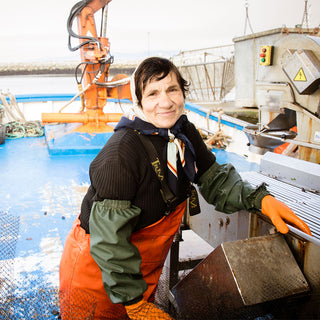
CULTURE: TURNING THE TIDE
Our mussel operations support the communities that work the farms, strengthening tradition and building hope for the future.
Mussel and shellfish farming have supported the Galician village of Vilanova de Arousa for decades. In the early 21st century, large canning factories started leaving Spain for countries with cheaper workforces, threatening the village’s economy and way of life. Conservas Antonio Pérez Lafuente, a family-owned canning company, decided to redouble its support of local farmers. “We decided that the only way to survive was focusing on what we had been doing for all our company history … local products, productions and lifelong traditional recipes,” says Juan Pérez Lafuente, whose family started Conservas Antonio Pérez Lafuente in 1892. The company, located not far from the rafts where the bivalves are harvested, was the first in the European Union to earn organic certification for its canned mussels.
Although mussels are native to the southern regions of Portugal and Chile, mussel farming is a newer practice in these regions. The farms we work with in Portugal and Chile are both certified by the Aquaculture Stewardship Council (ASC), which means they meet strict standards for social responsibility as well as minimal environmental impact. Those standards include providing a safe and equitable working environment for its workers, fair wages and regulated working hours.
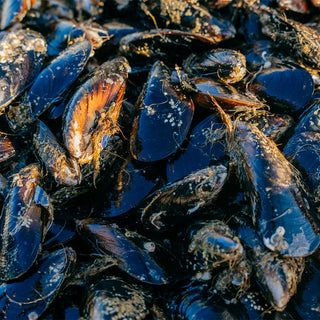
PARTNERS: GUIDED BY SCIENCE
In Spain, Portugal, and Chile, third-party supervisors oversee production of our mussels, ensuring quality and environmental protection.
In Spain, the farming of our mussels is overseen by CRAEGA, an organization created by the Spanish government to make sure that products in Galicia meet the European Union’s high organic standards. In Portugal, the supervising organization is SGS, a Geneva-based global testing, inspection and certification company.
The EU’s organic certification for aquaculture, established in 2009, sets comprehensive guidelines for mussels, including limiting the use of synthetic materials on the rafts and ropes to prevent chemical contamination; testing the waters for contaminants; and requiring mussel seed to be responsibly sourced. Mussel cultivators are also monitored to make sure that none of their methods harm other ocean or bird species. CRAEGA layers on its own requirements, like limiting the number of ropes and allowing only the native Mediterranean mussel species to be farmed in the waters of Galicia. In Portugal, SGS audits help make sure EU organic standards are met.
In Chile and in Portugal, the farms that supply our mussels are ASC (Aquaculture Stewardship Council) Certified. The ASC was founded in 2010 as an offshoot of the MSC (Marine Stewardship Council) and focuses exclusively on the management of aquaculture operations, as opposed to wild populations. The ASC’s Bivalve standards are equivalent to the EU Organic certification process and ensure legal compliance, preservation of the natural environment, biodiversity, and water resources surrounding our mussel farms. ASC certification goes beyond the EU Organic certification in that it layers in both species-specific standards, as well as a social responsibility component to the certification process. All farms must undergo yearly audits conducted by third-party accreditation to be compliant with ASC standards.

